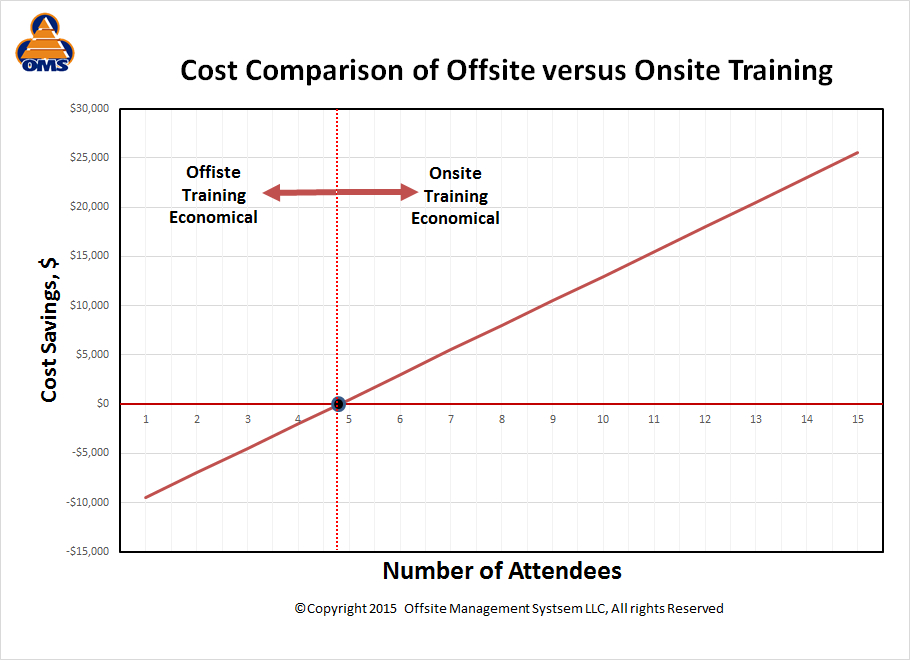In this Article...quick links
Everyone knows that when it comes to training budgets, every dollar counts, and you want to ensure that every participant gets as much from the training as possible and retains the new skills they learn. Studies in the USA have revealed that 90% of new skills are lost within a year, with the former BBC HR Director, Lucy Adams, recently claiming that up to 80% of training is forgotten in just 30 days. The environment in which the training is delivered is paramount to skill retention – this is why deciding whether a workshop should take place onsite or offsite can be a challenge, and there isn’t necessarily a right or wrong answer.
Whether you hold your team training onsite or offsite will depend on a number of different factors, such as your budget, the purpose of the training, who will be attending, and how appropriate your company premises are in terms of facilities, space and potential for interruptions.
Below, we’ve shared some advantages of each form of training, as well as some questions to consider before making a final decision.
Advantages of onsite workshops
Provided you have the space and facilities available at your company premises, there are a number of benefits to holding onsite training, including:
- Lower costs
- Onsite training is cheaper as there are no venue, catering, equipment and travel costs to factor in. This will allow you to allocate budget to other areas of L&D, such as future workshops, or including more team members in this workshop (if relevant to them).

http://globaloms.com/wp-content/uploads/2015/11/Onsite-vs-Offsite-Comparison.jpg
- Less travel time
- Not having to travel to and from an offsite location means more time can be spent conducting, reviewing, and debriefing from, the actual training.
- Staff are more accessible if work priorities unexpectedly come up
- If a sudden client emergency or other unexpected circumstance arises in the middle of a training workshop, it’s easier for employees to quickly step away or get back to their desk to take a phone call or complete an impromptu task if needed. This being said, this type of thing should be minimised if staff are to get the most out of the workshop. After all, it takes an average of 23 minutes and 15 seconds to get back on track after an interruption.
- Quicker and easier to organise
- Not having to organise an external venue will mean less time to organise, as you’ll need to make fewer phone calls to venues, caterers and technology hire companies.
Advantages of offsite workshops
Offsite workshops can take place at venues such as hotel function centres (for a large group), specialist training room centres, at the premises of the training provider you have selected, or even in an out-of-town location or full weekend training sessions. Some benefits of holding offsite training include:
- Minimal interruptions from colleagues
- Fewer interruptions mean participants will be more focused. Remember that there doesn’t need to be an actual disruption to throw off focus though – even the thought that they might be interrupted can sometimes be enough to throw peoples’ concentration off for the day.
- Participants can’t duck back to their desks during breaks
- Time spent madly checking emails or messages during every single break will mean that break times won’t be used as effectively as possible by discussing the training with colleagues and sharing their thoughts and ideas about what’s been covered so far.
- Imbues a sense of ‘specialness’ to the workshop
- If part of the objective of the session is to increase staff engagement, an offsite workshop will demonstrate a greater degree of company commitment and investment. And, as research has consistently shown, the more employees feel valued and invested in at work, the higher their wellbeing and productivity is. As stated by a recent article in Training Magazine, other psychological factors are also important here, and choosing to hold the training offsite is more likely to instill a sense of “we’ve invested in this offsite location, now we should make the sessions as productive as possible”.
- Offsites are often better at delivering team building outcomes
- Recent research from Citrix has shown that 31% of office workers hate team-building activities – Don’t let that dissuade you though – this can be negated by holding an offsite workshop. Offsite training courses can make the training/workshop seem more attractive, making attendees more positively predisposed to attend the training in the first place.
Some questions to ask yourself before making a final decision
Weighed up the pros and cons and still having trouble deciding whether your upcoming workshop should be held onsite or offsite? There are a few extra questions you can ask yourself before making a final decision.
What is the purpose of the workshop/training?
If the workshop is designed to provide people with new skills, then save your money and run the session onsite. Conversely, if it’s a strategy or ideation session where big picture, blue-sky thinking is required, then an offsite location that will help to shift people’s mindset and inspire creative thinking is recommended. The venue is important too though – a drab, uninspiring box of a room with depressing grey carpets, harsh fluorescent lights and rickety furniture that looks like it’s come straight out of the 70s (and not in a fun “retro” way) is not an environment that’s conducive to creative thinking. Try and choose somewhere where the interior decor has been thoroughly thought through and designed to be inspiring and comfortable – good lighting, comfortable furniture, colours, and plenty of space to think and explore ideas. Check out spaces like Bright HQ in Australia, or the US-based Living Room for a bit of inspiration.
Who are the people that will be participating the workshop/training?
If the group is more senior, it might be appropriate to run the session offsite, particularly if confidential information will be discussed. However, remember that doesn’t mean that more junior staff should only be offered onsite training.
How many people will there be?
For 1-to-1 training sessions, it makes sense to simply conduct these onsite. However, if it’s a large group, an offsite may be the only option in order to accommodate everyone comfortably. A cramped, squashed environment will just leave people feeling stressed and agitated after the first hour. Plus, if it’s a group presentation skills training situation, there will likely be portions of the day where the group is asked to split off into multiple smaller groups, and everyone will need their own semi-private space in which to work. Even if the room itself is small (such as a meeting room), ensure there are a few spaces around the office where breakout groups can go to work and discuss.
What is the potential for workshop interruptions?
If, despite everyone’s best intentions, you think the people attending the workshop are likely to get interrupted by their colleagues, or dragged out of the workshop to attend urgent matters, then an offsite should be considered. If however you think that this can be managed by setting clear expectations before and at the start the workshop, then opt for an onsite workshop.

Belinda is the Co-Founder and Managing Director of SecondNature International. With a determination to drive a paradigm shift in the delivery of presentation skills training both In-Person and Online, she is a strong advocate of a more personal and sustainable presentation skills training methodology.
Belinda believes that people don’t have to change who they are to be the presenter they want to be. So she developed a coaching approach that harnesses people’s unique personality to build their own authentic presentation style and personal brand.
She has helped to transform the presentation skills of people around the world in an A-Z of organisations including Amazon, BBC, Brother, BT, CocaCola, DHL, EE, ESRI, IpsosMORI, Heineken, MARS Inc., Moody’s, Moonpig, Nationwide, Pfizer, Publicis Groupe, Roche, Savills, Triumph and Walmart – to name just a few.
